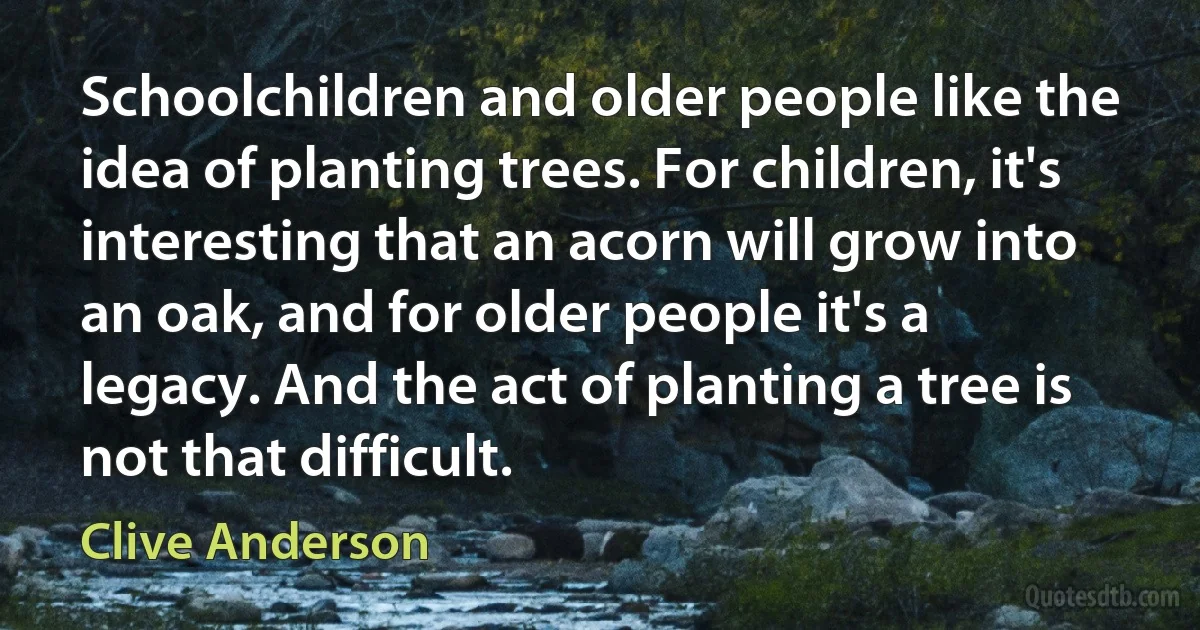Oak Quotes - page 2
Again she plunges! hark! a second shock
Bilges the splitting vessel on the rock;
Down on the vale of death, with dismal cries,
The fated victims shuddering cast their eyes
In wild despair; while yet another stroke
With strong convulsion rends the solid oak:
Ah Heaven!-behold her crashing ribs divide!
She loosens, parts, and spreads in ruin o'er the tide.

William Falconer
That the uneducated and the ill-educated should think the hypothesis that all races of beings, man inclusive, may in process of time have been evolved from the simplest monad, a ludicrous one, is not to be wondered at. But for the physiologist, who knows that every individual being is so evolved-who knows, further, that in their earliest condition the germs of all plants and animals whatever are so similar, "that there is no appreciable distinction amongst them, which would enable it to be determined whether a particular molecule is the germ of a Conferva or of an Oak, of a Zoophyte or of a Man";-for him to make a difficulty of the matter is inexcusable.

Herbert Spencer
At the same time we would most like to run the film back and see how the sanctuaries close again and the lights go out and the great powers of nature are once again met with deserved reverence. One can fell an oak in twenty seconds; but in order to become what it now is, it grew for a century.. ..Progress is but a word without sense, and the cow, which keeps the world alive, will not move faster than three kilometers per hour in the future, either.

Fernand Léger
The Machine Age's commitment to cause and effect was the source of many dilemmas, including the one involving free will. At the turn of the century the American philosopher E. A. Singer, Jr., showed that science had, in effect, been cheating. It was using two different relationships but calling both cause and effect. He pointed out, for example, that acorns do not cause oaks because they are not sufficient, even though they are necessary, for oaks. An acorn thrown into the ocean, or planted in the desert or an Arctic ice cap does not yield an oak. To call the relationship between an acorn and an oak ‘probabilistic' or ‘non deterministic causality,' as many scientists did, was cheating because it is not possible to have a probability other than 1.0 associated with a cause; a cause completely determines its effect. Therefore, Singer chose to call this relationship ‘producer-product' and to differentiate it from cause-effect.

Russell L. Ackoff
Democracy, it is quite true, has been a failure in many countries, but let me put this idea before you. Democracy was grafted in those countries on a stem of Absolutism, and the graft does not do well. It is not a natural growth, and in many countries Democracy blundered into chaos...But for us to surrender our liberty would indeed be to graft something completely alien on to the stem of an old oak. Do not forget, in spite of what is happening abroad, there are freedom-loving men and women in every country to-day in Europe. And you cannot think what anxiety they are looking to this country to-day as the last stronghold of freedom, standing like a rock in a tide that is threatening to submerge the world.

Stanley Baldwin
It is no ready made article; it has grown through the centuries as native to our country and people as the oak, ash, or thorn. It has given her people freedom and taught them the difference between freedom and licence. That is the Constitution that is threatened to-day, not quite openly yet, by the Socialist Party in their conference, tendenciously by sketching a course of action which if it takes place means the destruction of the Constitution. You may dispute that as much as you like, but in effect taking away the executive power of the House of Commons is the way every tyranny starts. It is proletarian Hitlerism and nothing else, and it can be nothing else. I want you to realize it in time.

Stanley Baldwin
He is unpardonable, therefore, who cannot distinguish one from the other; but lays on history the paint of poetry, its flattery, fable, and hyperbole: it is just as ridiculous as it would be to clothe one of our robust wrestlers, who is as hard as an oak, in fine purple, or some such meretricious garb, and put paint on his cheeks; how would such ornaments debase and degrade him!

Lucian
One day, during one of their sessions, Gurdjieff tells Peters to look out the window and describe what he sees. 'An oak tree' the child answers. 'And what do you see on the oak tree?' 'Acorns' Peters replies. 'How many of these acorns do you suppose will become trees?' Fritz Peters is stumped, [-] 'Maybe five or six?'
'No' retorts Gurdjieff. 'Only one will become a tree, perhaps, none! Nature is always very giving, but it only gives possibility. It takes hard work and great effort to become a tree or a genuine man.'

Henry Miller
And I learned very early [Josef Albers was then ten years old] how to make imitation of wood grain. This is something I have in common with Georges Braque. Braque also learned very early from his father how to imitate marble or wood grain. So I could easily make the appearance of oak or walnut on pine. That is very easy; a very simple technique. And I learned how to imitate marble. I never made such a good joke as Braque did. When he was in the Mediterranean he fooled his friends. He painted a rowboat that had wood on one side and marble on the other side. You see, when he'd row out of the city it looked as if he were in a boat of a different material than when he came back, you see, one side was imitation wood and the other side was imitation marble.

Josef Albers
It is not growing like a tree
In bulk, doth make man better be;
Or standing long an oak, three hundred year,
To fall a log, dry, bald and sere:
A lily of a day,
Is fairer far, in May,
Although it fall, and die that night;
It was the plant and flower of light.
In small proportions we just beauties see,
And in short measures life may perfect be.

Ben Jonson
We should take counsel of both nature and art in the consideration of this question. When the architect intends a grand structure, he makes the foundation broad and strong. We should imitate this prudence in laying the foundations of the future Republic. There is a law of harmony in all departments of nature. The oak is in the acorn. The career and destiny of individual men are enfolded in the elements of which they are composed. The same is true of a nation. It will be something or it will be nothing. It will be great, or it will be small, according to its own essential qualities. As these are rich and varied, or pure and simple, slender and feeble, broad and strong, so will be the life and destiny of the nation itself. The stream cannot rise higher than its source. The ship cannot sail faster than the wind. The flight of the arrow depends upon the strength and elasticity of the bow, and as with these, so with a nation.

Frederick Douglass
No, what was sad in his case was that he, who didn't care for carved oak, should have his drawing-room panelled with it, while people who do care for it have to pay enormous prices to get it. It seems to be the rule of this world. Each person has what he doesn't want, and other people have what he does want.

Jerome K. Jerome
There is much to be said concerning retirement. Some men cannot survive it because they have not prepared themselves for it. For the man who has retained his curiosity, retirement in old age can be the most enjoyable period of his life; but he must be aware of the emptiness of public renown and desire the peace of obscurity; he must still have the wish to learn and understand; in his village, his garden, or his house, he must have some restricted personal occupation. The wise man, after having given all his time to his public activities, now devotes himself entirely to his personal affairs and development; and this will be easier for him if he has been able to interest himself in poetry and the beauties of nature, even during his busiest years. For myself, I cannot imagine a pleasanter old age than one spent in the not too remote country where I could reread and annotate my favorite books. "The mind," says Montaigne, "must thrive upon old age as the mistletoe upon a dead oak."

André Maurois
Allen of Bath procured them the same honours from thence; and for some weeks it rained gold boxes: Chester, Worcester, Norwich, Bedford, Salisbury, Yarmouth, Tewkesbury, Newcastle-on-Tyne, Stirling, and other populous and chief towns following the example. Exeter, with singular affection, sent boxes of heart of oak.

Horace Walpole
O lay me, ye that see the light, near some rock of my hills! let the thick hazels be around, let the rustling oak be near. Green be the place of my rest; let the sound of the distant torrent be heard. Daughter of Toscar, take the harp, and raise the lovely song of Selma, that sleep may overtake my soul in the midst of joy; that the dreams of my youth may return, and the days of the mighty Fingal.

James Macpherson
The Muslim invaders, no doubt, came to India singing a hymn of hate against the Hindus. But, they did not merely sing their hymn of hate and go back burning a few temples on the way. That would have been a blessing. They were not content with so negative a result. They did a positive act, namely, to plant the seed of Islam. The growth of this plant is remarkable. It is not a summer sapling. It is as great and as strong as an oak. Its growth is the thickest in Northern India. The successive invasions have deposited their ‘silt' more there than anywhere else, and have served as watering exercises of devoted gardeners. Its growth is so thick in Northern India that the remnants of Hindu and Buddhist culture are just shrubs. Even the Sikh axe could not fell this oak.

Bhimrao Ramji Ambedkar



